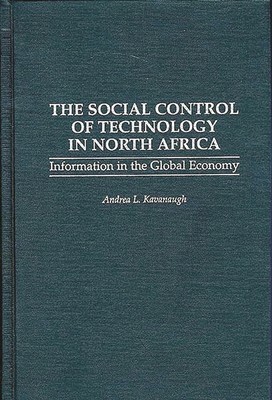
- We will send in 10–14 business days.
- Author: Andrea Kavanaugh
- Publisher: Praeger
- ISBN-10: 0275948153
- ISBN-13: 9780275948153
- Format: 14.8 x 21.8 x 1.8 cm, hardcover
- Language: English
- SAVE -10% with code: EXTRA
The Social Control of Technology in North Africa (e-book) (used book) | bookbook.eu
Reviews
Description
In order to improve productivity and economic development, developing countries have been expanding their telecommunications infrastructure and integrating advanced information technology into their socioeconomic system. Some scholars argue that new media will be integral to the overthrow of authoritarian regimes and will allow democracy to bloom throughout developing countries. Others claim that new media will strengthen centralized control and further erode social liberty and pluralism. This study of three North African states--Tunisia, Algeria, and Morocco--argues for a third, more likely outcome.
Developing countries, the author argues, are largely able to control the introduction and diffusion of new information technologies and services, including the Internet, using traditional procedures. The authoritarian governments in North Africa allow a slow, careful disbursement of new media privileges to a select minority. By maintaining direct or indirect social control over the market for advanced technologies and services, these governments can embrace new media for modernization, economic growth, and integration into the global economy without being overcome by civil unrest or instability.
EXTRA 10 % discount with code: EXTRA
The promotion ends in 21d.00:29:17
The discount code is valid when purchasing from 10 €. Discounts do not stack.
- Author: Andrea Kavanaugh
- Publisher: Praeger
- ISBN-10: 0275948153
- ISBN-13: 9780275948153
- Format: 14.8 x 21.8 x 1.8 cm, hardcover
- Language: English English
In order to improve productivity and economic development, developing countries have been expanding their telecommunications infrastructure and integrating advanced information technology into their socioeconomic system. Some scholars argue that new media will be integral to the overthrow of authoritarian regimes and will allow democracy to bloom throughout developing countries. Others claim that new media will strengthen centralized control and further erode social liberty and pluralism. This study of three North African states--Tunisia, Algeria, and Morocco--argues for a third, more likely outcome.
Developing countries, the author argues, are largely able to control the introduction and diffusion of new information technologies and services, including the Internet, using traditional procedures. The authoritarian governments in North Africa allow a slow, careful disbursement of new media privileges to a select minority. By maintaining direct or indirect social control over the market for advanced technologies and services, these governments can embrace new media for modernization, economic growth, and integration into the global economy without being overcome by civil unrest or instability.


Reviews